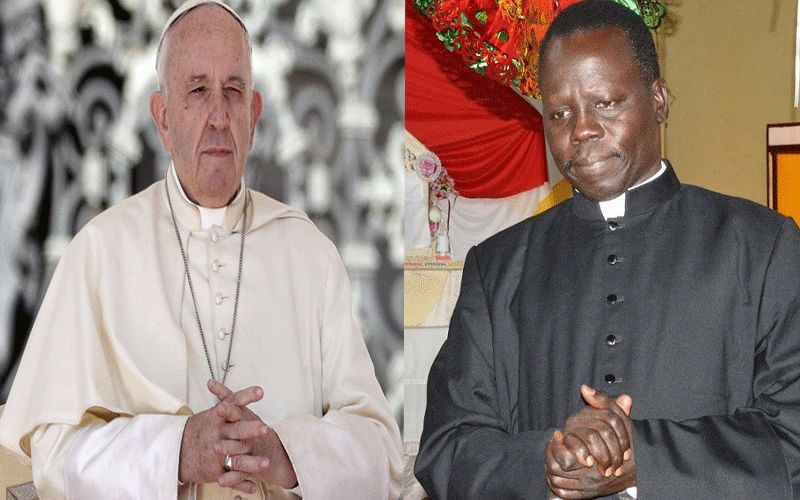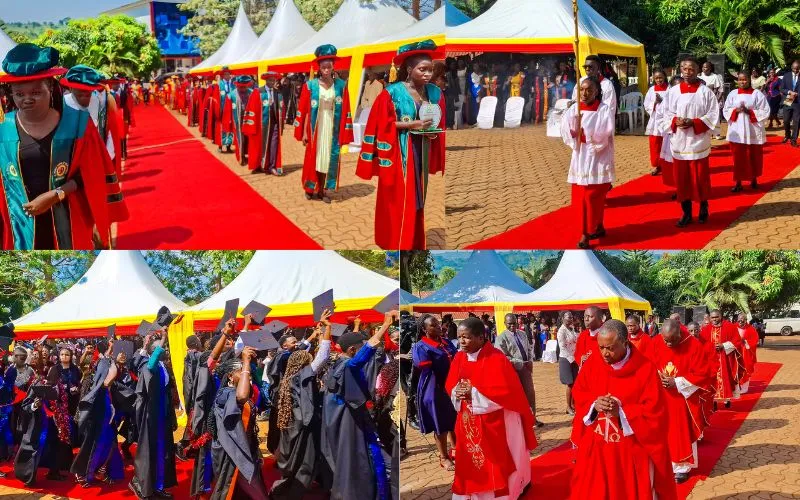The holder of Advanced Diploma in Planning and Management of Development from the Kenya-based Catholic University of Eastern Africa (CUEA) also highlights the contribution of the Vatican in education of the people of God in his country as well as coordinating humanitarian interventions through Church-based institutions and personalities.
Aturjong, a parishioner at Juba’s Holy Rosary parish faults those opposed to the appointment of Bishop Ameyu to head the only Metropolitan Archdiocese in the world’s youngest nation saying the claim that the process of identifying candidates was “not transparent is a mere lie.”
The rejection “is not accepted by the majority of Catholic faithful in all dioceses of Sudan and South Sudan,” he says adding that the news of the rejection astonished “the Catholic faithful as well as other Christian’s dominations” in the country.
“The Vatican has a right to choose (Prelates) among priests who were presented,” Aturjong underlines.
Unlike signatories to the protest letters who claimed that the personnel at the Apostolic Nunciature in South Sudan are compromised by the Government, Aturjong says that “the majority of people in the Archdiocese of Juba appreciate the role of the Vatican through its Nunciature in Juba.”
(Story continues below)
According to Aturjong, a native of South Sudan’s Wau diocese, Vatican’s decision to establish a Nunciature in South Sudan is a visible expression of the closeness of the Pope to the people of God in South Sudan and a success story.
The Holy See “officials namely H.G. Bert Van Megen, Apostolic Nuncio (in) South Sudan and Kenya and Msgr. Mark Kadima, Papal Chargé d’affaires (in) South Sudan have contributed significantly in repairing the broken relationship between government and Church as well as the faithful who are from different Catholic dioceses of South Sudan and Sudan,” Aturjong testifies.
He adds, “Chargé d’affaires, Msgr. Kadima managed to bring back the South Sudan Catholic faithful who abandoned the church due to bias criticism. He managed to encourage all clerics and laity to work together as followers of Jesus Christ as well as people from the one Catholic domination.”
He terms the allegations leveled against the Vatican diplomats in South Sudan as part of the “local dirty politics of tribalism which does not serve the interest and will of the (Lord) Jesus but individuals’ interest.”
In their December 12 letter, the group of three clerics of Juba Archdiocese and five laymen charged South Sudan government officials and some Juba-based clerics of conspiring with Vatican diplomats to promote Bishop Ameyu as Archbishop of Juba for personal interests.
The signatories of the letter accused Bishop Ameyu of having concubines in Juba and for being a biological father of six children.
“The accusations tabled against (Archbishop-elect) Ameyu are baseless and unfounded,” Aturjong, a former parishioner of Juba’s St. Joseph’s parish, says.
Although Aturjong acknowledges Archbishop Paulino Lukudu’s many years of service and his impact on the people of God in South Sudan in general and Juba Archdiocese in particular, he raises questions about the Prelate’s role in the rejection of Bishop Ameyu.
Archbishop Lukudu “has been a charismatic leader, who is admired by all people of South Sudan and Sudan as well as African Countries for his role in keeping faith in Archdiocese of Juba,” 56-year-old Aturjong says and recognizes the Prelate’s standing with the people through the many years of conflict.
“He did not abandon his Christians,” Aturjong says in reference to 79-year-old Archbishop and adds, “He saved lives of many Christian and non-Christians. He stood against National Congress Party and its security agents in Juba and round Juba. He was for dignity and freedom of the people of South Sudan and Sudan.”
However, the seeming silence of Archbishop Lukudu on the issue of Bishop Ameyu’s rejection concerns Aturjong, a holder of an online degree of Mass Communication at Washington International University (WIU).
“Since he (Archbishop Lukudu) is still the spiritual leader of Catholic Church of Sudan and South Sudan,” Aturjong observes, the Prelate “should come up clearly to disassociate himself from shameful act of some clerics and laity.”
Focusing specifically on the allegations leveled against Bishop Ameyu, Aturjong faults Archbishop Lukudu.
If it were true that Bishop Ameyu has concubines and children, why did the Archbishop remain silent over the years, Aturjong probes and concludes, “by failing (to) inform the Vatican, that means that these accusations are baseless.”
Referencing Bishop Ameyu’s ministry before his appointment as a Bishop in January 2019, Aturjong probes, “How comes a married Father is entrusted to train future priests at St Paul’s Major Seminary in Juba?”
He also wonders why Archbishop Lukudu, aware that Ameyu has wives and biological children, failed to oppose his “appointment as bishop of Torit” and in fact went ahead to be the Principal Celebrant at Ameyu’s episcopal ordination.
He also wonders about the apparent silence of the three South Sudanese Prelates who belong to Bari ethnic group.
That Archbishop Lukudu, his Auxiliary Bishop Santo Loku Pio, and Bishop Erkolano Lodu Tombe of South Sudan’s Yei Diocese “did not produce a statement openly to disassociate themselves (as to say) they are not part and partial of (the) rejection letters” raises questions about their innocence.
Aware of the challenges that have bedeviled the world’s newest nation since December 2013, the South Sudanese media practitioner calls on Church personnel to work toward peace in his country, remaining obedient to the Holy See.
“I call on our clerics and laity to work for peace and unity of the people of South Sudan and (remain) obedient to the Vatican since Catholics all over the world are obedience to the Vatican,” Aturjong says.
“I also urge the Vatican to work closely with local Church leaders and laity to make sure that this humiliating and shameful act is not repeated by some South Sudanese clerics and laity,” he adds.
Aturjong encourages the Holy Father “to appoint Bishops or Archbishop outside of their dioceses of origins so that the tribalism or ethnicity can be discouraged.”
“Some wrong elements in the Church do think that (the) church is their property, therefore they should own its resources,” the South Sudanese Catholic says and concludes, “The Church in South Sudan and Sudan is a church of Jesus Christ; it is not a tribal Church in which some individuals work for their own interests rather than Jesus Christ’s interest and the will of God.”
Fr. Don Bosco Onyalla is ACI Africa’s founding Editor-in-Chief. He was formed in the Congregation of the Holy Ghost Fathers (Spiritans), and later incardinated in Rumbek Diocese, South Sudan. He has a PhD in Media Studies from Daystar University in Kenya, and a Master’s degree in Organizational Communication from Marist College, New York, USA.








